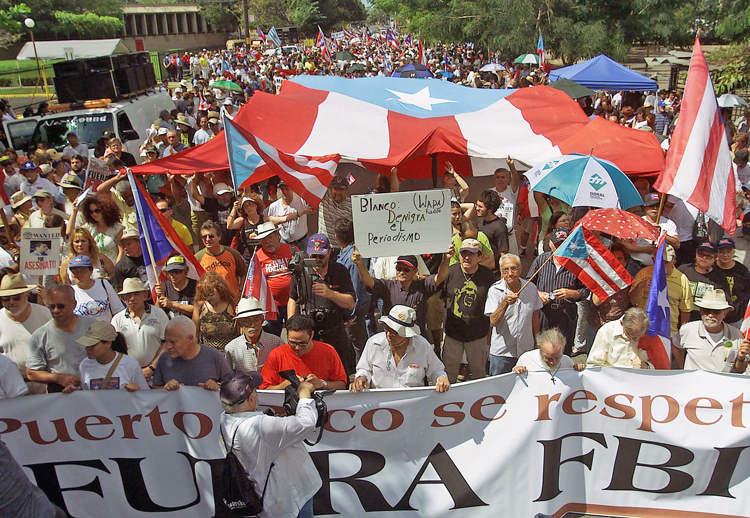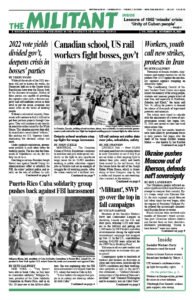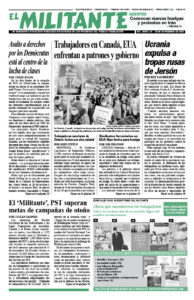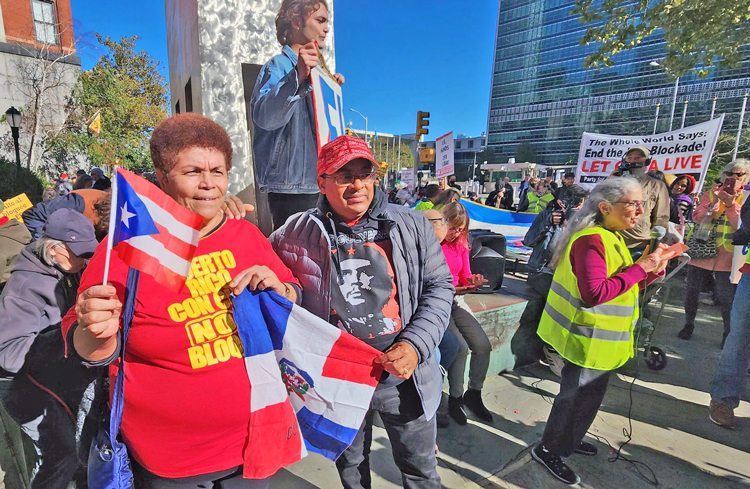NEW YORK — “They haven’t been able to break Cuba, so they have to criminalize solidarity,” Milagros Rivera, president of the Cuba Solidarity Committee in Puerto Rico, said in an Oct. 28 interview at the Militant office here. She was explaining why the FBI harassed members of a brigade from the U.S. colony that went to Cuba in July.
“It also bothers the empire that people in its colony are showing solidarity with Cuba.”
FBI agents visited or called at least 62 people in Puerto Rico at the end of August. All but a few had gone on the Juan Rius Rivera Solidarity Brigade to Cuba. Alerted about the FBI operation by the Cuba Solidarity Committee, all of them refused to talk to the U.S. rulers’ political police.
The FBI fishing expedition was aimed at finding some legal pretext to go after the Solidarity Committee and Rivera. Agents acted friendly, inviting brigadistas to talk over coffee. “It’s like they wanted to say, ‘Look, we’re nice people,’” she said, and that everyone should forget the history of the FBI in Puerto Rico.
Some agents claimed the brigade had been infiltrated by Cuban security — an out-and-out lie — or had violated a U.S. “law” they refused to name.
Rivera was in New York for a three-day tour to speak out against the FBI intimidation. She spoke to a class at Hostos Community College, was on a panel at a meeting of 120 at the People’s Church in East Harlem, and joined a march against the U.S. economic war on Cuba Oct. 29.
During the pandemic, Rivera explained, the Solidarity Committee organized people in Puerto Rico to send half a million syringes to Cuba so that the five vaccines Cuban scientists developed against COVID-19 could be used. Syringes are in short supply because of Washington’s brutal sanctions.
While building solidarity with Cuba, “we have also been able to get out the word about our situation as a U.S. colony,” she said. “That doesn’t make them happy either.”
Puerto Ricans were given U.S. citizenship in 1917, Rivera noted, to allow Washington to draft Puerto Ricans into the U.S. Army in World War I.
“The colony has served the U.S. rulers well,” she said. That’s why solidarity with Cuba “has made us a little bit dangerous. We are demonstrating that we are not satisfied with what the U.S. is doing with Cuba nor with what it is doing with Puerto Rico.”
Washington recently gave $2 million to “aid” Cuba after Hurricane Ian, Rivera noted, “an infinitely small amount compared to what Cuba loses every day from the U.S. blockade. Both the Democrats and Republicans want to strangle Cuba because it’s an example for the world.”
What “Cuba needs,” Rivera said, “is all the U.S. sanctions lifted.”
FBI, an instrument of colonial rule
Rivera explains, “The FBI is an instrument to perpetuate colonial rule in Puerto Rico.”
Its long history as the U.S. rulers’ political police, attacking labor unions, Black rights groups, the Socialist Workers Party and others, also includes its systematic targeting of fighters for Puerto Rican independence over decades.

In 1937 FBI agents helped railroad Puerto Rican Nationalist Party leader Pedro Albizu Campos to prison. He was charged with conspiracy to overthrow the government, despite no evidence he had carried out a single illegal act.
“They even had a file on Luis Muñoz Marín,” she said, the colony’s first elected governor and an important figure in aiding the U.S. rulers’ efforts to disguise their colonial rule on the island.
That’s why the FBI has been trying to change its image, Rivera said. It’s carried out well-publicized arrests of union and government officials and cops on charges of corruption, trying to paint itself as a friend of the Puerto Rican people.
“It’s like what you say about the raid on Donald Trump’s mansion,” Rivera said, referring to the Militant’s explanation that whenever the U.S. government violates the constitutional rights of anyone, the same and worse will be done, and has been done, against working people.
Rivera’s first personal experience with the FBI’s trampling of constitutional rights was 37 years ago.
On Aug. 30, 1985, 200 heavily armed FBI agents raided 38 homes and the offices of independence activists in Puerto Rico, as part of going after the Macheteros, a pro-independence group accused of robbing a Wells Fargo armored truck in Hartford, Connecticut, in 1983. The agents arrested 11 independence activists and confiscated the printing press of Pensamiento Crítico, a pro-independence magazine.
The FBI occupied the apartment building where Rivera still lives. “We were not part of the Macheteros, but we were an important voice in opposing the FBI raids,” she said. “I called NotiUno radio station and they were the first to report that the FBI had invaded the Los Robles cooperative.
‘Prisoners in our own homes’
“The FBI was in the hallways. They didn’t let the lawyers enter the building,” Rivera said. “It’s like we were prisoners in our own homes. They carted off sealed boxes. They had wiretapped many people’s phones.
“The FBI couldn’t utilize in court a lot of what they took because it wasn’t taken legally,” Rivera said.
“A neighbor who was not an independentista said, ‘Let’s all go wash our clothes together’” as a way to protest, Rivera recalled. “The residents filled the hallways despite the presence of FBI agents armed with automatic weapons.”
Twenty years later the FBI surrounded the house where Macheteros leader Filiberto Ojeda Riós was living after he had escaped from prison in the U.S. After gravely wounding him, the FBI wouldn’t let anyone approach the house for 20 hours, ensuring the independence fighter bled to death. Thousands in Puerto Rico turned out for his funeral.
That experience is still remembered in Puerto Rico today.
The FBI has not tried to contact anyone on the Juan Rius Rivera Brigade since August, Rivera notes, but members of the committee assume the FBI is still looking for ways to target them. The best defense against the FBI is to continue building solidarity with Cuba — the committee is already organizing next year’s brigade — and to keep denouncing any FBI disruption attempts.
We have a saying, Rivera says, “We are Puerto Ricans and we’re going to Cuba.”


